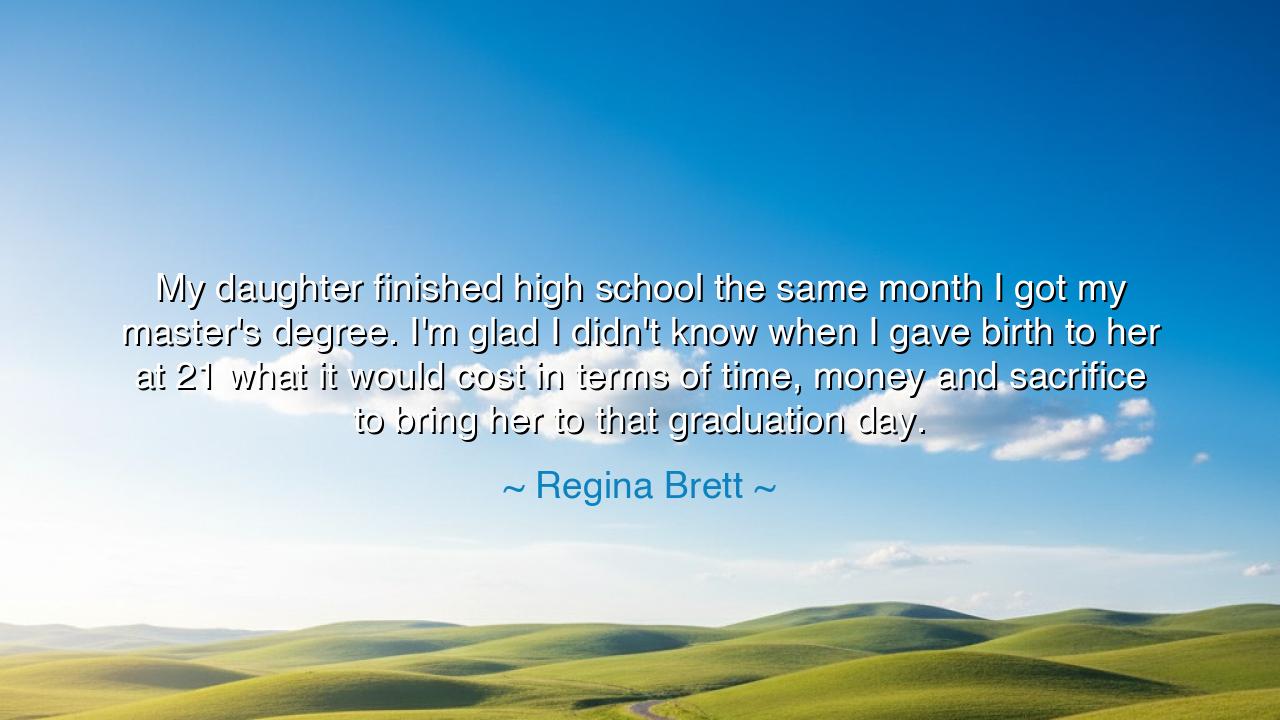
My daughter finished high school the same month I got my master's
My daughter finished high school the same month I got my master's degree. I'm glad I didn't know when I gave birth to her at 21 what it would cost in terms of time, money and sacrifice to bring her to that graduation day.






In the heartfelt words, “My daughter finished high school the same month I got my master's degree. I'm glad I didn't know when I gave birth to her at 21 what it would cost in terms of time, money and sacrifice to bring her to that graduation day,” Regina Brett unveils a truth that belongs to the timeless rhythm of life — that the path of love and perseverance often demands more than we can foresee, yet rewards us in ways beyond all imagination. Beneath her reflection lies not complaint, but reverence — reverence for the struggle, the sacrifice, and the slow, sacred unfolding of purpose through years of toil. It is the voice of a mother who has climbed two mountains at once — raising a child and raising herself — and who, looking back from the summit, finally sees the beauty in every hardship she endured.
The origin of this quote springs from Brett’s own journey, a life marked by grit, faith, and relentless determination. As a single mother who pursued higher education while raising her daughter, she lived in the constant tension between responsibility and aspiration. Her story is one of those quiet heroics that seldom make headlines: studying by lamplight after bedtime stories, stretching every dollar, and pressing forward through fatigue that no one else could see. When she speaks of being “glad she didn’t know” what it would cost, she means not ignorance, but grace — for if we truly knew the weight of the journeys that await us, our courage might falter before our first step. Some burdens can only be carried by faith, not foresight.
In her words, there echoes an ancient truth about the mystery of endurance. The mothers and fathers of old knew this intimately: that the labor of love is never measured in comfort, but in constancy. In the Book of Ruth, the young widow follows her mother-in-law Naomi into an uncertain land, saying, “Where you go, I will go.” She could not have known the trials that awaited her — hunger, hardship, heartache — yet from that steadfast devotion would come generations of kings. So too does Brett’s story speak of a devotion that gives without measure, walking through unseen valleys for the sake of another’s dawn. Her words remind us that love’s worth is often revealed only after the struggle is done.
The image she paints — a mother and daughter graduating together, each at her own threshold of life — is profoundly symbolic. It is the meeting point of two destinies, forged through shared endurance. The mother’s degree represents not just intellect, but triumph over limitation; the daughter’s diploma symbolizes the fruit of that sacrifice. Together they stand as living proof that perseverance begets possibility, that one generation’s courage becomes the foundation for the next. This dual graduation is more than ceremony — it is a sacred passing of the torch, a silent vow that the struggle was worth every sleepless night.
Her confession, “I’m glad I didn’t know,” also carries the tone of humility — the wisdom that life must unfold one challenge at a time. The ancients taught that the gods veiled the future from mortals not to torment them, but to preserve their will to act. To know too much is to despair; to know too little is to drift. But to walk forward in partial light — trusting that each step has meaning — is the essence of courage. Brett’s story is a testament to that sacred blindness. Her faith in the unseen allowed her to endure what might have seemed impossible had she known it all in advance. In this, her motherhood becomes a mirror of the eternal truth: that great love requires both ignorance of the cost and acceptance of the burden.
Her experience resonates with the story of Sojourner Truth, who, born into slavery, walked miles to reclaim her stolen son — uneducated, poor, and alone. She could not have known the full measure of her suffering, nor the power of her future voice, yet each step she took was a declaration of faith stronger than any foresight. Like Regina Brett, she reminds us that the human spirit is capable of far more than reason dares to predict. Those who walk out of love, not calculation, change not only their own lives, but the lives of generations yet unborn.
The lesson of Brett’s reflection is clear: the hardest roads are often the most transformative. Do not be afraid of the unknown cost of your calling — for the value of what you build will far outweigh the pain it takes to build it. Let your sacrifices become your strength, your struggles the scaffolding of something greater. Each small act of endurance, each unseen moment of persistence, becomes part of the architecture of triumph.
And the practical action is this: when life demands more than you think you can give, remember that you are being stretched toward a horizon you cannot yet see. Do not measure your effort by comfort or speed; measure it by love. Whether you labor for a dream, a family, or a cause, know that what feels impossible today may one day stand as your greatest proof of grace. For as Regina Brett’s story teaches us, the cost of sacrifice fades, but its legacy endures — and in the fullness of time, even exhaustion becomes glory.






AAdministratorAdministrator
Welcome, honored guests. Please leave a comment, we will respond soon